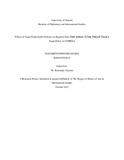| dc.description.abstract | This study seeks to establish the effect of Kenya‟s sugar protectionist policy on industries,
interstate relations and in effect regional integration. It will lay emphasis on sugar protectionist
policies and specifically address Kenya‟s sugar protectionist policy and its effect on relations
with other COMESA member states.
The overall objective of this study is to find out the Effects of Sugar Protectionist Policies
on Regional Inter-State relation: A Case Study of Kenya‟s Sugar Policy in COMESA. For this
objective to be achieved, the study will sought to address and evaluate the role of protectionist
policies in the sugar industry, determine COMESA member states reaction to Kenya‟s sugar
protectionist policy and to establish the effect of protectionism on the process of regional
integration. This study will show that despite the Neoliberal assertion that calls for opening up of
a state‟s borders to international trade and deregulation of markets by governments,
protectionism in some industries is actually necessary and beneficial
The study is exploratory in nature using both qualitative and quantitative methods.
Through interviews data was obtained from the Ministry of Foreign Affairs and International
Trade, interviews with key informants involved in generating policy within regional bodies like
COMESA, interviews from the Kenya Sugar Directorate and from academia.
The hypotheses in the study revealed that since Kenya took up the protectionism
measures for its sugar industry, it has become an efficient sugar producer compared to how it
before the safeguard. The study was also able to annul the view that Kenya‟s safeguard had no
effects on its relations with COMESA member states. Even with support from the COMESA
member states through the approval for the extension of Kenya‟s sugar safeguard, the safeguard
drew various reactions from member states. The finding in the study was that states like Uganda
and Southern Sudan found it to be interfering with their national interests, respectively. The study has also proven that the safeguard has not halted the regional integration process with no member state dismembering itself from the COMESA body. | en_US |

